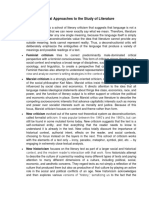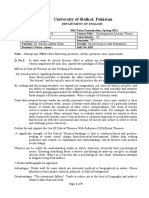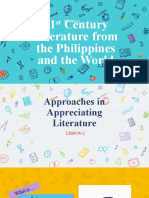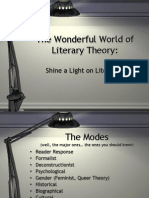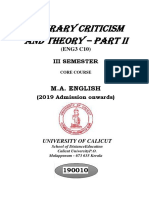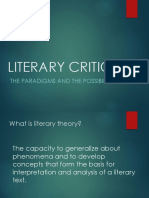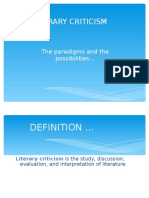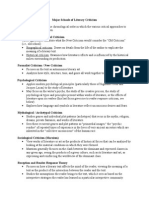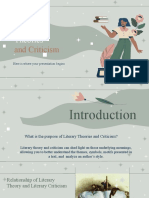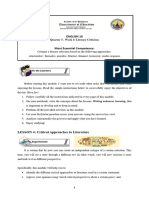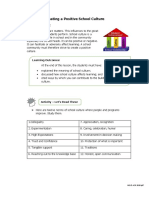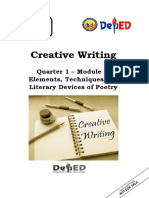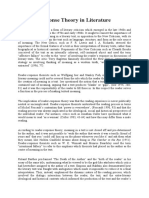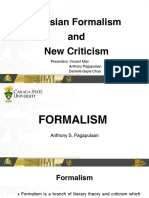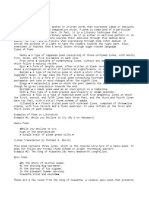ELE 208 (Literary Criticism for Teachers)
Course Guide
1st Semester, AY 2024-2025
Unit 3: Modern Criticism Schools of Thought
Desired Learning Outcomes:
At end of the unit, the students must have:
a) traced the developments in literary criticism from traditional to modern times;
b) familiarized the intellectual, linguistic, socio-emotional and artistic influences of
literatures through literary theories;
c) identified definite characteristics of each literary theory for an in-depth study of
literature; and
d) created a critical analysis of a poetic text through a definite literary theory.
Topics:
1. Overview of Modern Criticisms, and Schools of Thought
2. Formalism and New Criticism
3. Archetypal Criticism
4. Historicism
5. Marxist Criticism
6. Feminist Criticism, Gender Studies and Queer Theory
7. Structuralism
8. Deconstructionism
Literary Criticism
There are several ways of reading a text. Various approaches offer a range of
perspectives and are utilized to engage in critical analysis of numerous texts.
Formalism and New Criticism
attempts in making literary criticism a scientific study
believes that every piece of literature must work in unity and should exhibit a unified
meaning
meaning is obtained by analyzing the parts from the whole work
demands careful reading of the text
disregards the impact of the reader’s experiences
Archetypal Criticism
influenced by Carl Jung’s idea of collective unconscious of people
certain archetypes are identified; recurring patterns or images; cycles
relies on operating symbols and patterns of universal scale
�Historicism
observes the culture and society which conceives a certain work of literature as well
as their influences to the text
considers significant information as regards the author, political events, social
customs, philosophy, and other special circumstances
Marxist Criticism
holds the longest history of phenomenon in the 20 th century
gives function to literature’s political and cultural agenda
sees literature as driven by ideologies of the lead social class
considers the use of literature to challenge class oppressions
utilizes the ideas of Mao Tse Tung regarding what literature must answer (Whom to
serve? How to serve)
Feminist Criticism, Gender Studies and Queer Theory
focuses on how gender affect a writer, a work of literature, and a reader
examines the status of and portrayal of men and women in the work; explore issues
of sexuality, power, and marginalized populations (Woman as other) in literature and
culture
shows awareness of complex interaction among people
Queer theory is a term that emerged in the late 1980s for a body of criticism on
issues of gender, sexuality, and subjectivity that came out of gay and lesbian
scholarships
Structuralism
combines the linguistic theories of Saussure and cultural theories of Levi-Strauss
sees literature as a system of interlocking signs that are arbitrary in nature
explains that signs have no definite meanings since meanings must be qualified
continuously
Deconstructionism
proposed by Jacques Derrida
believes that language refers only to itself and not to an extratextual reality
stresses numerous conflicting interpretations
interpretations are based on social, political, or philosophical implications of the
utilizations of language
predisposes that a work’s meaning changes as influenced by particular place or
situation
Learning Activities:
Task 1. Make a graphic organizer as a summary of the different literary approaches.
Task 2. Look for sample critiques of three literary approaches of your choice.
� Assessment Tasks:
Choose one short story or poem written in English from a definite literary period. You
may check the different websites or books for some short stories and poems. Read the
text at least twice and write a critical analysis using a literary approach of your choice.
Follow the structure given below:
Introduction
Plot Summary/Description
Analysis/Interpretation
Conclusion/Evaluation
Your work will be checked based on the following criteria:
Content - 50%
Organization - 30%
Mechanics - 20%
-------
100%
Time Frame: (Week 10-14)
References:
Bantados, W., Marcos, L., & Valez, S. (2012). Introduction to literature. Manila: Purely
Books Trading & Publishing Corp.
Baronda, A.J. (2016). 21st Century literature from the Philippines and the world. Pasay City:
JFS Publishing Services.
Gnenoba, F., & Okoroegbe, F. (n.d.) Literary theory and criticism. Lagos: National Open
University of Nigeria
Golban, P. & Ciobanu, E.A. (2008). A short history of literary criticism. Turkey: Üç Mart
Press.
